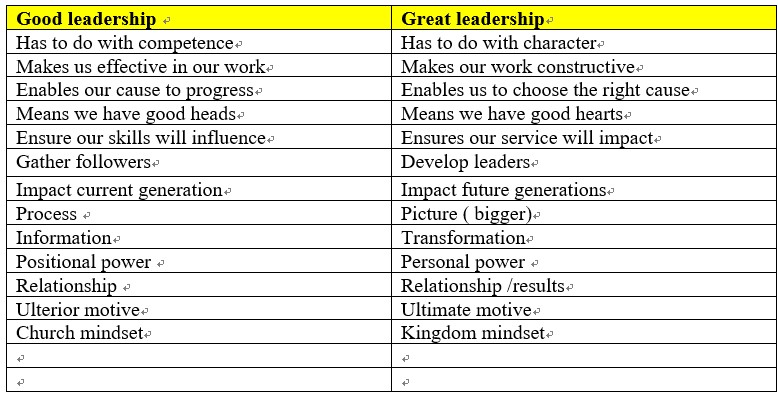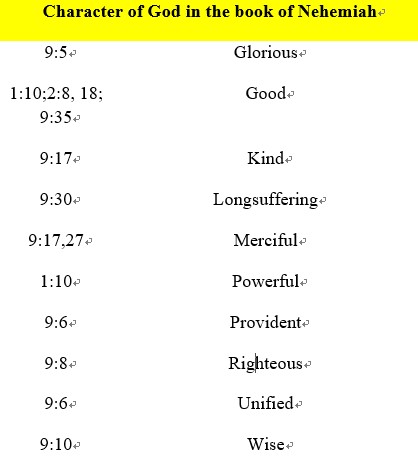A Nehemiahian Model of Leadership
- Leadership is influence (2:5-8, 16-18)
- Everything rises and falls on leadership (4:9-15)
- Leadership must be in the hands of few, ministry in the hands of many (5:1-7)
- Leadership takes responsibility for every area of the task (6:1-5)
- The most important ingredient in leadership is credibility/integrity (5:14-19)
- Leaders possess tremendous faith in people (3:1-32)
- Leadership can be taught (4:21-23)
- Great leaders are effective communicators of vision ( 2:17-18)
- Problem solving is the quickest way to gain leadership ( 4:7-23)
- Great leadership is always assisted by other people ( 3:1-32, 13:13)
B Leadership Bytes in Nehemiah
- Leadership begins with a sense of destiny accompanied by burden.
- Leadership is motivated by goodness and glory
- The quickest way to stop a great work is to stop a great leader.
- Leaders must model courage and call out courage from the people.
- Incarnational leadership studies the truth, practises the truth and teaches the truth.
- Stay focused on your mission, flexible on your methods
- If you compromise the ultimate, you become slave to the immediate .
- Passion and conviction mark the difference between a great and mediocre leader
- Leaders must hear from God before they speak for God
- Good leaders follow through their commitment regardless of the cost
- Success without a successor is a failure
- Acid test of leadership is after a leader is gone.
- Leaders must learn to lead themselves before they lead others
- Leaders should lead from strength and giftedness
- People first buy into the leader before they buy their cause
- Leaders must be willing to take risks and pay the price; courage elicits commitment.
- Compromise on methods not conviction or principles.
- Good leaders do whatever it takes to get the job done
- Leadership must be proactive not reactive
- A leader is destined to fulfill his/her sense of destiny
- Timing is everything. When to lead is as important as what to do and where to go.
- Vision owns him rather than he owns the vision
- Discernment precedes decision, analysis precedes action.
- Read the signs before we lead.
- In times of crisis, leaders must act decisively.
- Keep first thing first. Distraction is the enemy of distraction
- Leaders must touch heart before they ask for the hand
- Can't break trust with people and influence them
- Relationship before rules
- Activity does not equal accomplishment
- Good idea is not necessarily godly idea
- Leadership is influence
- Leaders must be secure enough to handle conflict, crises, confrontation
- Leaders must be good followers. You cannot lead well without following well
- Leadership must be driven by values not public opinion
- Leaders guided by principles and values.
- Leaders gain credibility by their own vulnerability and transparency
- Leaders take refuge in the lord and allow him to fight the battles for and through them.
- Leaders value time but don't kill time
- Leaders must be flexible because of changes
- Leaders cannot show the way until they know the Way
- A leader does not abdicate his role in the face of opposition and difficulties.
- Leadership is a life we live and not a show we perform
- Leadership plus hypocrisy equals leadership minus credibility
- Leadership is best exercised in team when complimentary gifts are used.
- Change comes the inside out.
- Leaders must be willing to confront tough issues.
- Leadership is being before doing
- We must lead ourselves before we lead others.
- Leaders who show the way succeed faster than those who share the way.
- Leadership means you lose the right to be selfish.
- Successful projects bring glory to God
- Security is only found in God and not followers
- God plus one is a majority
- God is the source not people or material resources
- God selects leaders based on heart not head and hand
- God accomplishes his purposes through unlikely people.
- Unlikely candidates can become leaders ( Jepthath)
- God will work on behalf of leaders who surrender to him.
- God prepares a person through experiences before he positions them for leadership. Usually, they have no idea what God has in store for them.
- God is in the business of working through his people to accomplish seemingly impossible tasks.
- Prayer is the first resource not last resort
- Pray for your own ministry
- Followers take the path of least resistance and migrate towards their comfort zone.
- Courage and fear are contagious
- Outward public reform begins inward personal renewal.
- Stop sacrificing , stop succeeding
- People do what people see
- Use head to understand people, use heart to love people and use hand to help people.
- Troubles come when leaders try to keep their job than do their job
- Character before conduct, spiritual formation before skill formation
- Any Problems can be solved if relationship can be managed.
- People follow leaders that give hope and direction
- Strategic planning that ignores God or leave him out of the equation is doomed to fail
C Differences Between Great and Good Leadership

D Followers and Leaders

E Self-Leadership
- Work on yourself- you are your greatest asset or worst liability
- Work on your priorities - fight for the important ones
- Work on your strength - you can reach your potential if you do
- Work with your colleagues - You can't be effective alone.[1]
F 11 Keys to Excellence
- First value excellence
- Do not settle for average
- Pay attention to detail
- Remain committed to what really matters
- Display integrity and sound ethics
- Show genuine respect for others
- Go the second mile
- Demonstrate consistency
- Never stop improving
- Always give 100%
- Make excellence a lifestyle. [2]
G How To Be a Leader of Influence[3]
- Believe in God
- Believe in your message, your people and yourself.
- Be credible.
- Touch a heart before asking for a hand.
- Share the "why" before the "what".
- Do not compromise on absolutes
- Lead by example
- Place passion above position, people over procedure,
- Be fixed in mission, flexible in methods
- Perceive God's purpose, pursue God's glory.
- Improve you communication skills ability.
- Stay focused on objectives not on obstacles
- A leader's influence flows from his identity.
H Theology in the Book of Nehemiah
The faithfulness of God in restoring of the people after Babylonian to the covenant land as a theocratic (Kingdom of God) community even under Gent rule. He did it by moving their hearts of Persian emperors and of the repatriates and those who supported them raised up prophets to prods and support he repatriates protected them on the way del them form opponents, stirred up Ezra and Ne to perform their separate ministries and prospered the rebuilding of the temple. All Israel was repatriated through a remnant. – temple rebuilt , daily services ( daily sacrifices, priestly ministries, Lev ministries, annual festivals revived in accordance with the law of Moses. Law established regulative for the life of the community ‘holy city (Jer) was rebuilt and inhabited, people purged and covenant renewed. Israel’s ret drew fierce opposition but thwarted by God/. They were also in need of constant rebuke and reformation. The Israelites were still wayward people, awaiting a new covenant which Jer spoke of ( 31) , the renewal to be effected by God’s spirit as announced in Joel (2) and Ezekiel 36-37H
God’s sovereignty- he is sovereign over all rulers, pagan kings (1:1; 6:22; 7:6, 27). He controls history and orchestrates events for his purposes. Despite opposition God will fulfil his promises and protect his people.
God does not speak or come to Nehemiah in a vision. Yet we know he was at work. Silence of God does not mean absence. God chose to work behind the scene and also in our lives.
Reconstruction of the temple but also spiritual renewal of the fabric of the community.
I Character of God in the Book of Nehemiah

